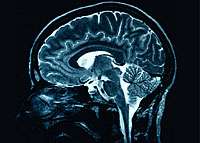Children's brain processing speed indicates risk of psychosis

(Medical Xpress)—New research from Cardiff and Bristol universities shows that children whose brains process information more slowly than their peers are at greater risk of psychotic experiences.
These can include hearing voices, seeing things that are not present or holding unrealistic beliefs that other people don't share. These experiences can often be distressing and frightening and interfere with their everyday life.
Children with psychotic experiences are more likely to develop psychotic illnesses like schizophrenia later in life.
Using data gathered from 6,784 participants in the Children of the 90s study at Bristol university, researchers from the MRC Centre for Neuropsychiatric Genetics and Genomics in Cardiff University and the School of Social and Community Medicine in the University of Bristol examined whether performance in a number of cognitive tests conducted at ages 8, 10 and 11 was related to risk of having psychotic experiences at age 12.
The tests assessed how quickly the children could process information, as well as their attention, memory, reasoning, and ability to solve problems.
Among those interviewed, 787 (11.6 per cent) had suspected or definite psychotic experiences at age 12. Children that scored less well in the various tests at the ages of 8, 10 and 11 were more likely to have psychotic experiences at age 12.
This was particularly the case for the test that assessed how quickly the children processed information. Furthermore, children whose speed of processing information became slower between ages 8 and 11 had greater risk of having psychotic experiences at age 12.
These findings did not change when other factors, including the parent's psychiatric history and children's own developmental delay, were taken into account.
Speaking about the findings, lead author and PhD student Miss Maria Niarchou from Cardiff University's School of Medicine said:
"Previous research has shown a link between the slowing down of information processing and schizophrenia and this was found to be at least in part the result of anti-psychotic medication.
"However, this study shows that impaired information processing speed can already be present in childhood and associated with higher risk of psychotic experiences, irrespective of medication.
"Our findings improve our understanding of the brain processes that are associated with high risk of psychotic experiences in childhood and in turn high risk of psychotic disorder later in life."
The study's findings could have important implications for identifying children at risk of psychosis, with the benefit of early treatment.
Senior author, Dr Marianne van den Bree of Cardiff University's School of Medicine, said:
"Schizophrenia is a complex and relatively rare mental health condition, occurring at a rate of 1% in the general population. Not every child with impaired information processing speed is at risk of psychosis later in life. Further research is needed to determine whether interventions to improve processing speed in at-risk children can lead to decreased transition to psychotic disorders."
Ruth Coombs Manager for Influence and Change Mind Cymru said:
"This is a very interesting piece of research, which could help young people at risk of developing mental health problems in later life build resilience and benefit from early intervention.
"It is important to remember that people can and do recover from mental health problems and we also welcome further research which supports resilience building in young people."
The paper is published today, 1 May, in the American Journal of Psychiatry.















